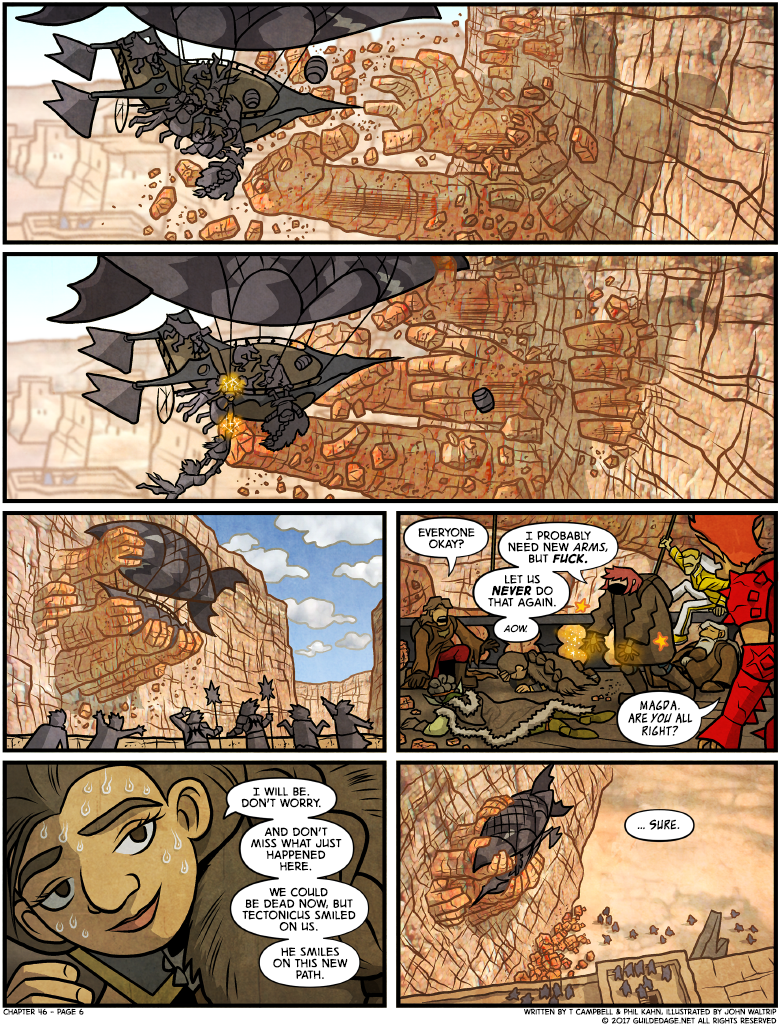Annotated 46-6
 Magda’s interpretation of events is not totally unreasonable. A lot of people who have near-death experiences end up feeling like they’ve been saved for something. For his part, Penk is worried that this is actually a bad omen for his dreams of unity. The PeaceChampions have been reunited all of three minutes, and the very act of their reuniting caused a nearly fatal crash landing. (I think that’s implicit in his “Sure,” but I also thought the Weo thing from a few pages back was implicit in the text, so what do I know.)
Magda’s interpretation of events is not totally unreasonable. A lot of people who have near-death experiences end up feeling like they’ve been saved for something. For his part, Penk is worried that this is actually a bad omen for his dreams of unity. The PeaceChampions have been reunited all of three minutes, and the very act of their reuniting caused a nearly fatal crash landing. (I think that’s implicit in his “Sure,” but I also thought the Weo thing from a few pages back was implicit in the text, so what do I know.)
A whole lot depends on how you choose to read the tea leaves. Even the statement “it’s all open to interpretation” can be good news or bad news, depending on if you’re more concerned about objective facts or the freedom to carve your own future.
FB: “You could even say he’s giving us a BIG HAND! Wonk wonk wonk wonnnnnk!”
“You’re dehydrated, Magda.”











For my part, Penk’s “sure” does work pretty much as you say. He agrees logically but he doesn’t quite feel it right now. Probably hanging on to some hope that he won’t have to confront Harky about everything. And thinking that the scene that just played out, independent of the truth of Magda’s words, won’t make that confrontation any easier.
Also: You’re putting a lot of commentary out there, about the background story you had in mind when you wrote this. I think almost no author does this, and any sufficiently interesting text/story will have some ambiguities. I think it always helps if the author has a consistent world in their mind, well beyond what is directly described or even hinted at in the text. I bet there is tons of such background details that next to nobody gets (or lots of people get wring) in most of fiction.
Which is to say: I don’t think it diminishes your work if some of the details you imagined don’t arrive as planned. And I would hope that some of the reader feedback you’re getting here helps you understand better which of your jokes and allusions “land” and how.
What I appreciate the commentary for: I’m often having difficulties reading between the lines or catching implied meanings, so dissecting the story and some of its scenes in this way is actually pretty good training for me. Sorry for putting up so much resistance on the Weo story. One component is surely that I don’t *want* anything to happen to him, but the other is that while your version of the backstory is of course not excluded, I don’t really see anything that directly points to it, either — which I think is still fine because there’s nothing wrong about readers being able to interpret things whichever way they like as long as it doesn’t end up conflicting with what happens later in the story.
Gravedust and Harky fall, Frigg catches Gravedust with one hand. It’s just barely visible, but that’s what Frigg refers to in panel 4. On one hand, it’s an achievement of the artist that this is still readable. On the other hand, it’s questionable if one should expect their audiences to decipher comics to this level of minute detail.
Byron’s got Gravy (ponytail).
Penk (not Harky) goes for Magda, falls off the side, catches her legs/robes, and Frigg catches Magda’s arm and pulls them up glowystyle.
I mean, it still works if we don’t decipher that level of detail and just assume that Frig got hurt in the crash.
The fact that we have discussion on this just serves to illustrate my point. It’s definitely Frigg who catches Gravedust, since Magda’s hair is braided. Harky/Penk mix-up is my mistake.
I didn’t try to work those details out the first or second time I read the story. This time round I tried to and took a while to work things out.
…but the story doesn’t gain too much from it, or loose anything if you don’t do it, so I consider this sort of thing a bonus. I’m pretty sure that nobody *expected* a significant portion of readers to decipher everything, but I think it’s nice they went to that level of detail. If there were just some generic figures in vaguely dangerous positions *someone* would take the time to go through and point out that some inconsequential detail or another wasn’t consistent.
Instead, John (potentially following a request from Flo or T) went and made it all consistent, while giving those hardcore readers something to chew on. I like that, even if I’m not one of the people who tries to decipher and interpret that kind of thing.
Penk’s skepticism (which totally came through for me) aside, Magda does have a point, here – she just successfully channeled Tectonicus’ power to aid them. Not a super-glowing endorsement of the alliance, but at least it’s a sign that Tecty’s OK with it enough not to take away the power to punish the blasphemy.
Yeah, with these cleric types, it’s always a bit difficult to tell which part of their special abilities is a properly controlled ability they can yield (which was granted to them by their respective deities) , and which part is their deity responding to a request for help.
I usually assume it’s the former, because some god doesn’t have time to run about and work wonders anytime someone wants to light a campfire in a more convenient way. In this case, though, my impression was that Magda was not in a position to directly control the rock as she did e.g. in the last big battle. She was dangling upside down from an airship and was just praying to Tectonicus to please help.
…at least that’s the interpretation that seems to make most sense to me right now. And it would make sense because that would mean Tectonicus didn’t just *not* revoke Magda’s powers, he actively supported “his” people.
I thought she meant that that because she asked Tectonicus to do his will and he answered. Implying that if he didn’t agree with this union he’d let them get fugged.
Which was also a discussion around the winter elves’ story.